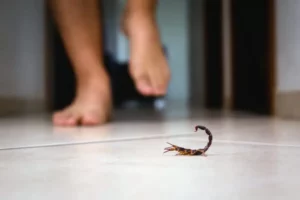Home / Blog / Weevils Infestation 101: What to Do About Bark Beetles
Weevils Infestation 101: What to Do About Bark Beetles

Scientifically reviewed by Daniel Baldwin, BCE, CCFS, CP-FS
-Published on May 22, 2023
-Updated on May 22, 2023
Bark beetles have made headlines in recent years due to major outbreaks in California and other parts of the U.S. As climate change causes warmer temperatures and increased drought events, bark beetle infestations are likely to become more common, making it important to know the facts about bark beetle control.
What is a bark beetle?
Bark beetles, or weevil beetles, are insects that belong to the Curculionidae family. These beetles tunnel into wood to lay their eggs, which hatch beneath the bark of trees. Weevil larvae then feed on the wood beneath the bark, causing trees to develop oozing spots. Growth in those affected areas then wilt, and leaves and needles may drop early.
After a few months, larvae enter the pupa stage. When they emerge as adults, they chew through the wood and find mates to restart the life cycle.
Bark beetle damage to trees can be severe. Scientists express concern that infestations may impact carbon levels in the atmosphere due to the devastating effect these pests have on trees that remove carbon dioxide from air.
Although they prefer to live outdoors, finding bark beetles in a house is possible. Most often, the pests end up indoors accidentally. They may enter through gaps around window screens, crawl under doors, or get in through cracks and crevices in a home’s structure.
What does a bark beetle look like?
There are many types of weevils in the U.S. and Canada, and each weevil species has its own characteristics. One thing most species have in common is a curved protrusion on the front of their head that people commonly call a snout.
Most bark beetles are one-sixth to one-quarter of an inch long. Some species fly, but not all do. Bark beetles are generally brown and may have yellow or lighter brown markings, depending on the species. Larvae are usually yellow with brown heads and have plump, wrinkled bodies.
Where do bark beetles live?
Bark weevils live throughout the U.S. They tend to seek out trees that are already damaged or stressed due to weather. Different species prefer various types of trees. Some make their homes in evergreens like the Douglas fir, while others nest in and feed on deciduous trees like the American elm and slippery elm.
What fungus is spread by bark beetles?
Bark beetles often develop symbiotic relationships with fungi, meaning that the two organisms live side by side and benefit each other. The elm bark beetle is particularly well known for spreading Ophiostoma novo-ulmi fungus, which causes Dutch elm disease in trees.
Trees infected with Ophiostoma novo-ulmi lose their leaves at a faster rate and begin to wilt. The damage caused by the fungus makes it easier for the bark beetles to nest in affected trees. At the same time, the beetles help the fungus by transporting it to new trees, where it can multiply and cause new infections.
What is the best bark beetle treatment?
The key to successful bark beetle treatment is to use products and tools ideal for the particular species. Because there are so many types of weevils and identifying them can be difficult, it’s generally best to leave the job to a professional pest control company with experience treating bark beetles in your area.
How to get rid of bark beetles in a house
If bark beetles have found their way indoors, a severe infestation is unlikely, and you may be able to deal with the problem on your own by:
- Capturing the pests with a broom and dust pan and removing them
- Running the vacuum regularly and emptying the bag or canister after use
- Installing door sweeps
- Replacing caulk and seals around windows
- Repairing cracks and other damage to your home
- Removing dead or diseased trees and tree stumps from your property
Should your attempts at bark beetle control not resolve the issue, a professional pest control company can assist you.
Related Articles
Visit our blog to learn more.
→






